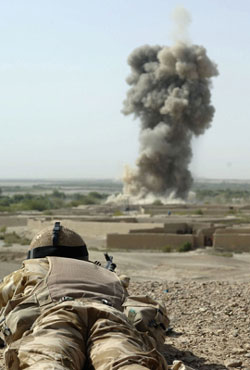Imperialist war in Afghanistan intensifies
British general: Fiercest combat since Korean War
(lead article)

|
Crown Copyright via Getty Images/Cpl. Mike Fletcher
|
|
British soldier watches the aftereffects of airstrike during fighting August 24 in southern Afghanistan. |
BY PAUL DAVIES
LONDON, September 10—Eight British soldiers were killed in combat in Afghanistan in August, and another 20 in the first 10 days of September, bringing the year’s toll to 36. Lt. Gen. David Richards, commander of the NATO forces in the country, called the combat under way the worst sustained fighting the British military has faced since the 1950-53 Korean war. The casualties are the highest the British armed forces have suffered since the 1982 war against Argentina to maintain colonial control of the Malvinas islands off the South American coast.
NATO forces are engaged in the largest military operation since the imperialist alliance took command from Washington of the occupying forces in southern Afghanistan in July. The battle is raging in the southern province of Kandahar against the Taliban, the former ruling party that was toppled in the 2001 U.S.-led invasion. The Taliban have reportedly taken control of at least one town in the area.
On September 7, James Jones, the U.S. general who is NATO’s supreme allied commander, called for reinforcing the 19,000-strong NATO force in Afghanistan by an additional 2,500 soldiers. Washington has another 20,000 troops in the country under its own command.
The brunt of the combat has fallen on 4,500 British troops, according to the September 8 Financial Times. London has already announced it is dispatching another 1,000 soldiers to Afghanistan, but NATO officials say it seems difficult now to muster additional troops from other countries.
Led by Canadian forces and known as “Operation Medusa,” this is the first brigade-level battle NATO has ever fought. Over the past month NATO “has been engaged in the toughest fighting since it was formed in 1949,” said the Financial Times. The operation involves air strikes, artillery barrages, and ground troops. NATO officers claim their forces have killed 420 people in the course of the operation since September 2.
“The intensity and ferocity of the fighting is far greater than in Iraq” and involves hand-to-hand combat, according to Brigadier Ed Butler, commander of the British forces in Afghanistan. In the town of Sangin British paratroopers reportedly resisted 44 attacks in 25 days, and British forces had to abandon attempts to re-supply their garrison at Musa Qala, as it came under heavy attack. Taliban forces were able to retake the town of Garmser on September 7, reported the Daily Telegraph.
Since September 1, five Canadian and 19 British soldiers have been killed. British prime minister Anthony Blair declared that Britain must “stand firm” and be “proud” of its forces in Afghanistan. Col. Tim Collins, who commanded British forces during the 2003 Iraq war, and Gen. Patrick Cordingley both criticized what they called the lack of resources to sustain London’s role in the imperialist operations in Afghanistan.
Gen. Jones, NATO supreme commander in Europe, took the unusual step of voicing in public his dismay that the 26-member military alliance had failed to provide the troops and equipment needed for such a mission. NATO chiefs say another 2,500 troops would allow them to rapidly deploy a mobile reserve to “trouble spots.”
The German, Italian, and Turkish governments have expressed reluctance to move their troops from safer parts of Afghanistan to the south.
The September 10 Sunday Telegraph said the government of Britain is now officially at war. Under new rules of engagement commanders have legal authority to launch air strikes against suspected Taliban strongholds and conduct ambushes and order pre-emptive attacks against enemy camps.
Meanwhile, in a September 7 state visit to Kabul, Afghanistan’s capital, Gen. Pervez Musharraf, Pakistan’s president, appeared in a joint news conference with Afghanistan’s president, Hamid Karzai.
In an apparent policy shift, Musharraf pledged to seek out and destroy the command structure of al-Qaeda and Taliban forces operating in Pakistan. “There are al-Qaeda and Taliban in both Afghanistan and Pakistan,” he told the media. “Clearly they are crossing from the Pakistan side and causing bomb blasts in Afghanistan.” His government has nothing to do with such attacks, he said. “We have to see where their command structure is, who is their commander, and we must destroy the command structure.”
“I was very happy to hear this is not sponsored by Pakistan,” responded Karzai.
| 


